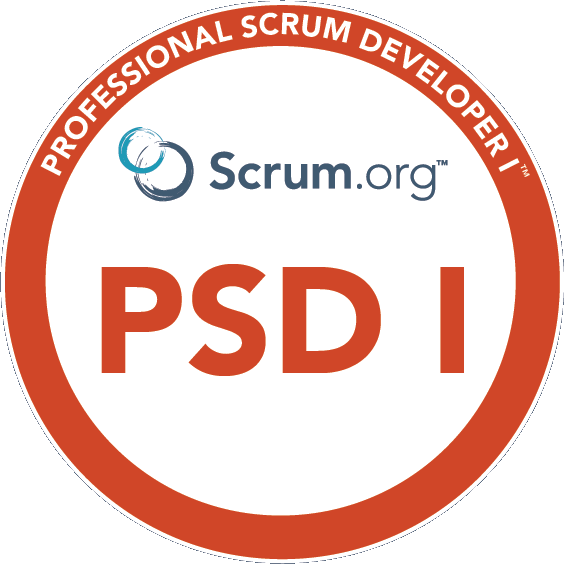Professional Scrum Developer (PSD) Certification

Introduction to the PSM I Certification
Overview
In the ever-evolving field of software development, Agile methodologies are now a standard practice. However, for developers working within Scrum teams, merely understanding Agile principles is often not enough. The Professional Scrum Developer (PSD) certification from Scrum.org sets a new standard by focusing not just on knowledge of Scrum but on the technical skills needed to deliver high-quality software within a Scrum framework. By earning this certification, developers showcase their commitment to Agile excellence and gain valuable skills that set them apart in a competitive field.

Key Facts
- Launch Date: 2010
- Founder: Ken Schwaber
- Number of Certified Professionals: Over 22 000 globally
- Global Recognition: The PSD certification is valued by employers worldwide, making it a key credential for developers looking to succeed in Agile environments.
Target Audience
PSM I is aimed at Software Developers and Engineers, Technical Professionals in Cross-Functional Teams, Development Managers and Technical Coaches, and anyone working with Scrum. The PSD certification helps these professionals align technical work with Agile principles and equips them with techniques and tools to deliver high-quality software using Scrum.
Certification Objectives and Learning Outcomes
The PSD certification validates skills and knowledge essential for effective Scrum development, including:
- Delivering Incremental Value: Ensuring developers can deliver functional increments within a Scrum framework.ings.
- Understanding Scrum Fundamentals: Knowledge of Scrum roles, events, and artifacts in the context of software development.
- Applying Technical Practices: Skills in practices like test-driven development (TDD), continuous integration (CI), and pair programming.
- Facilitating Collaboration: Ability to work effectively within cross-functional Scrum teams.

Skills and Knowledge Gained

The Professional Scrum Developer (PSD) certification equips candidates with essential skills and knowledge to work effectively within Scrum teams, focusing on Agile development practices. Key skills and areas of knowledge include:
- Scrum Framework: Deep understanding of the Scrum roles, events, and artifacts, and how they relate to the development process.
- Technical Practices: Familiarity with key Agile development practices, such as test-driven development (TDD), continuous integration (CI), and refactoring, ensuring high-quality code.
- Team Collaboration: Enhanced skills in working collaboratively within cross-functional teams, fostering a culture of openness and continuous improvement.
- Incremental Delivery: Ability to deliver functional product increments iteratively, aligned with Scrum’s emphasis on delivering value frequently.
- Problem-Solving in Scrum Context: Techniques for identifying, discussing, and resolving issues within the framework of Scrum, improving overall team performance.
Detailed Breakdown of the Certification Process
Steps to Certification
Pre-requisites: While there are no formal prerequisites, it’s highly recommended that candidates have a foundational understanding of Scrum. Reviewing the Scrum Guide (available for free on Scrum.org) and attending a Professional Scrum Developer course are beneficial for PSD candidates.
Training Requirements: Formal training is not required but is strongly encouraged. Scrum.org offers various training options, including two-day workshops and online modules led by Professional Scrum Trainers (PSTs). These courses provide hands-on experience with Agile technical practices and better prepare candidates for the PSD exam.
Exam Format:
- Number of Questions: 80
- Question Type: Multiple-choice and true/false
- Time Limit: 60 minutes
- Passing Score: 85%
- Retake Policy: Candidates who do not pass may retake the exam by purchasing another attempt.
Certification Levels: Scrum.org offers additional certifications for developers and other Scrum roles, each validating different areas of expertise in Agile practices.
Recertification: The PSD certification is valid for life and does not require renewal, making it a one-time investment

Key Benefits of the Certification for Organizations

Impact on Teams and Organizations
Organizations with PSD-certified professionals benefit from enhanced code quality, more efficient Agile development cycles, and improved collaboration within cross-functional teams. Developers with PSD certification contribute technical expertise that supports teams in delivering high-quality software in iterative cycles and adapting to changes effectively.
Real-World Application
At companies like Spotify and Philips, PSD-certified developers have played a key role in reducing software release times by 25%, improving integration processes, and boosting overall productivity. Scrum’s framework has proven especially valuable in enabling teams to meet shifting market demands and improve responsiveness.
Industry Recognition
The PSD certification is recognized by top companies, including IBM, Oracle, Bosch, and SAP, which prioritize hiring developers proficient in Agile practices. This global recognition makes the PSD certification one of the most respected credentials for Agile developers working within Scrum teams.
Case Studies
At Siemens, the inclusion of PSD-certified developers in Agile teams led to a 20% increase in development efficiency and a noticeable reduction in defects. Another example is ING, where PSD-certified professionals helped to streamline code review processes, resulting in faster and more reliable releases and a 15% improvement in team velocity.
Certification Costs and Value Proposition
Cost of Certification
The PSD exam costs $200. While formal training is not mandatory, Scrum.org’s Professional Scrum Developer courses typically range from $1,000 to $1,500, depending on the provider.
Return on Investment (ROI)
The ROI for PSD certification is notable. Certified professionals report an average salary increase of 10-15% within their first year of certification. Additionally, PSD-certified developers are often considered for advanced roles within Agile teams, supporting their career progression in technical and Agile environments.
Financial Aid and Discounts
Scrum.org does not offer financial aid, but many training providers provide group discounts for companies certifying multiple employees. Organizations sponsoring training sessions for large teams can often secure reduced rates from these providers.

Comparison with Other Certifications

Competitor Analysis
The PSD certification is often compared to other development-focused certifications, such as the Certified Scrum Developer (CSD) from Scrum Alliance and the Agile Certified Practitioner (PMI-ACP) from the Project Management Institute. While CSD and PSD both focus on Agile technical skills, PSD is noted for its rigor, requiring a passing score of 85% on the exam, and does not mandate training, which allows for more flexible preparation paths.
Unique Features
PSD stands out for its lifelong validity, meaning no recertification is required, making it a one-time investment. Additionally, it focuses on Agile technical practices specifically aligned with the Scrum framework, preparing developers to work across various industries and project types with the same set of Agile technical principles. Unlike the CSD, which requires recertification every two years, the PSD certification remains valid for life.
Industry Trends
With the rise of Agile practices and a shift toward cross-functional, distributed teams, certifications like PSD are increasingly relevant. PSD emphasizes collaboration, technical best practices, and Agile adaptation, making it ideal for developers working in digital-first, remote, and Agile at scale environments.
Success Stories and Testimonials
Case Studies
At Bosch, PSD-certified developers played a crucial role in optimizing their software development processes, leading to a 15% reduction in release cycles for key products. Similarly, at ING, Agile teams with PSD-certified developers achieved a 25% increase in code quality and reduced deployment times through enhanced Agile practices.
Personal Success
James Carter, a PSD-certified developer at IBM, shared how the certification transformed his role within his team. “The PSD certification gave me the technical skills and confidence I needed to deliver high-quality code in every sprint. It opened doors to leadership opportunities within our Agile development initiatives.”
Notable Companies
Top organizations such as Oracle, Microsoft, Capgemini, and Honeywell require or prefer PSD certification for developers working within their Agile teams, underlining its growing demand and credibility in the industry.

The Future of Agile and This Certification

Emerging Trends
As Agile practices continue to evolve, certifications like PSD are adapting to address new challenges, such as Agile scaling, remote development team management, and the integration of DevOps practices. The PSD certification remains highly relevant, equipping developers with technical skills that are essential in today’s modern Agile environments.
Future Updates to the Certification
Scrum.org regularly reviews and updates the PSD exam to align with the latest industry practices. Future updates may place more emphasis on remote Agile development, collaborative tools, and advanced technical practices such as continuous delivery and automated testing.
Relevance in a Changing Market
As companies navigate increasingly complex project environments and rapid technological changes, the demand for Agile-certified developers will continue to grow. The PSD certification helps professionals stay relevant by providing the skills necessary to excel in high-performing, cross-functional teams and to support organizations in their digital transformation efforts.
Conclusion
The Professional Scrum Developer (PSD) certification is a valuable credential for developers seeking to excel in Agile and Scrum environments. By validating both technical skills and a solid understanding of Scrum practices, the PSD certification enables professionals to contribute effectively to high-performing Agile teams. As Agile continues to expand across industries and evolve with emerging trends, PSD-certified developers are well-positioned to lead and adapt in a dynamic market. For any developer aiming to strengthen their career in Agile, the PSD certification is a worthwhile investment that opens doors to greater opportunities and impact within their teams and organizations.